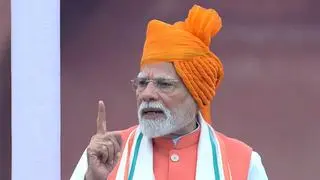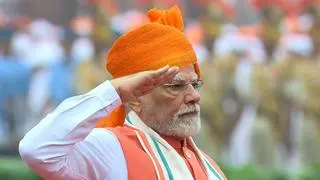
Prime Minister Narendra Modi
| Photo Credit:
ANI
Flagging obesity as a major challenge, Prime Minister Narendra Modi asked the people of India to contribute in the fight against it. He restated his earlier appeal to cut edible oil consumption by 10 per cent, which is also seen as a step to reduce edible oil import amid his call for Atmanirbhar Bharat.
Modi said that according to experts, one in every three persons would be obese in the coming years .
“While talking about fitness, I want to express a concern. Every family in the country should be concerned that obesity is becoming a major challenge for our country. We must protect ourselves from obesity,” he said appealing consumers to buy 10 per cent less oil for cooking.
Consumption of edible oil in the first quarter (April-June) of current fiscal is said to have dipped due to various factors including shifting preference of consumers. The drop also coincides with a government campaign to reduce consumption of edible oil, sugar and salt, using an appeal by the prime minister to cut use of cooking oil to stay fit.
In India, the per capita annual consumption of edible oil is 18 kg and that of sugar is around 20 kg, trade data show. India had imported 56 per cent of its total domestic consumption of edible oil in 2023-24 and the dependency increased to over 60 per cent in 2024-25, trade sources said.
The cooking oil import, which has also a direct co-relation with domestic demand, has dropped 17 per cent to 52.07 lakh tonnes (lt) during April-July from 62.94 lt in the year-ago period, the Solvent Extractors Association said. Except in June, when the import dropped by only 834 tonnes, all other months saw drop of 17-32 per cent.
“It may not be the sole reason, but Modi’s appeal to cut 10 per cent use of edible oil has definitely contributed which can only be ascertained through a survey. But, there is an overall negative sentiment on consumption,” the CEO of a leading edible oil brand had said last month.
The agriculture ministry first aired some jingles though FM radio channels in March this year appealing people to cut consumption of edible oil in which Modi’s appeal was included. Later, FSSAI started the same campaign by including sugar and salt in the appeal to stay fit.
The National Family Health Survey (NFHS) data during 2019-21 show that 24 per cent of women and 23 per cent of men are overweight or obese in India. It also found that 6.4 per cent of women and 4 per cent of men in the age group of 15-49 are classified as obese. The prevalence of overweight children under 5 years has also been rising and reached at 3.4 per cent.
According to a World Health Organization report, lack of an effective health system response to identify excess weight gain and fat deposition in the early stages of the population is aggravating the progression to obesity.
The WHO study said that obesogenic environment exacerbating the likelihood of obesity in individuals, populations and in different settings is related to structural factors limiting the availability of healthy sustainable food at locally affordable prices, lack of safe and easy physical mobility into the daily life of all people and absence of adequate legal and regulatory environment.
More Like This
Published on August 15, 2025


